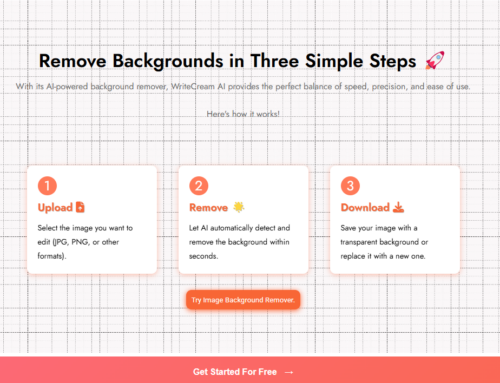There’s no denying the rise of automation in transforming customer relations in today’s digital landscape. This technology is best for marketing, a business strategy for reaching out to customers and promoting your brand and products or services.
Enter marketing automation, a game-changer in business for companies looking to maximize their returns on investment (ROIs).
Marketing automation can help you optimize operations, nurture prospects, and tailor customer interactions. You can employ automated workflows and data-driven insights to decrease manual labor and increase productivity, which translates to a boost in profitability.
This page shares what you ought to know about marketing automation. Read on to learn how to make the most of this technology for increased ROI.
What Is Marketing Automation?
Marketing automation involves using digital tools and technologies to automate various marketing activities, from search engine optimization (SEO) and pay-per-click (PPC) advertising to email, content, and social media marketing. This can also optimize marketing functions, such as data analysis, performance monitoring, sales forecasting, and business reporting.
Suppose you’re selling Rolex watches online while looking to access a global market and boost your sales. In this case, you can leverage software automation to identify prospects, customize marketing tactics, personalize content pieces, and analyze consumer behavior for informed business decisions.
The benefits of marketing automation are multifold. Its goal is to remove manual tasks, accelerate processes, increase productivity, and improve customer engagement. That ultimately translates to an increase in ROI!
Mordor Intelligence predicts the global marketing automation market will grow from $6.85 billion in 2024 to $15.36 billion by 2029 at a 17.54% compound annual growth rate (CAGR). As such, businesses invest in this technology to keep up with technological disruptions worldwide and digital marketing trends. 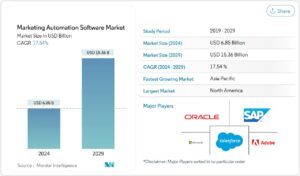
Learn more about the benefits of marketing automation in the next section.
Key Benefits of Marketing Automation
Marketing automation proves beneficial in more ways than one. According to Ascend2, the top benefits are improving customer experience (43%), enabling better use of working hours (38%), and better decision-making (35%).
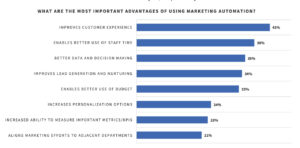
With the help of marketing automation as a robust toolkit, you can optimize your marketing endeavors and improve your business performance. As a result, you can enhance your customer interactions, increase your ROI, and obtain a competitive advantage.
Here’s how marketing automation can benefit your business:
- Task Efficiency: Marketing automation allows you to automate routine, repetitive processes. As a result, you can free up your marketing team’s time to concentrate on more strategic, income-generating work.
- Efficient Targeting: Marketing automation lets you segment your audiences and tailor your messages. That way, the correct messaging reaches the right prospects at the right time.
- Personalized Messaging: Through collecting customer data and leveraging data insights, marketing automation lets you offer customized and helpful content. That helps improve the customer experience.
- Multi-channel marketing: Marketing automation platforms easily connect with various channels. They enable you to run synchronized and consistent campaigns on websites, email, social media, and other digital platforms.
- Data Analytics: Automated marketing solutions collect consumer data and conduct a comprehensive analysis. As such, you can evaluate your marketing performance, make well-informed decisions, and continuously improve your campaigns.
- Smooth Reporting: Marketing automation offers thorough dashboards, analytics, and reports. These make it easier and simpler for your team to monitor and assess your marketing performance.
- Enhanced Engagement: Automated workflows and enhanced communications can improve your customer relations. Marketing automation lets you connect with the right audience efficiently and effectively for seamless and robust interactions.
- Augmented prospects: Marketing automation helps you find and prioritize high-quality prospects. By automating lead prospecting, scoring, and nurturing activities, you can generate more and more leads for your business.
- Enhanced ROI: Marketing automation can significantly boost your company’s ROI by launching more successful marketing initiatives. Through effective campaigns, you can get people to patronize your brand as well as buy your products or avail of your services.
Learn how to leverage marketing automation to increase your ROI in the next section.
How To Boost ROI Using Marketing Automation?
Increasing your ROI is plausible through effective marketing campaigns. And when it comes to this, automation is a powerful tool for achieving this business objective. The proof is in the numbers:
- Over 65% of marketing professionals believe they are somewhat successful in using automation to achieve their marketing goals.
- While 25% of marketers say they are very successful, only 9% report they are unsuccessful.
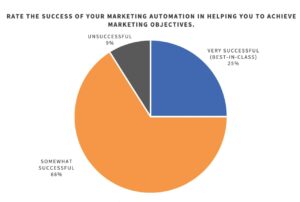
It’s critical, however, to match your marketing tools and strategies with your unique business needs and target customer base. Doing so allows you to hit your marketing goal—to boost your ROI!
That said, here’s how to use marketing automation to maximize your returns:
1. Start with Setting Marketing Goals
Clearly defining your marketing objectives is vital before deploying marketing automation. Setting these upfront makes it easier to choose the best technologies and techniques to get the desired results. The top goals for using marketing automation are optimizing overall strategy, improving data quality, and identifying ideal customers.
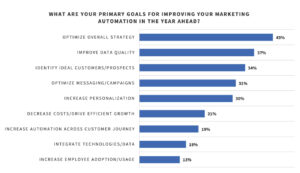
Ian Sells, CEO of Million Dollar Sellers, underscores the importance of setting marketing objectives. “These will guide you in choosing the best-automated tools or platforms and implementing the right marketing strategies.”
Sells cites some of the common marketing objectives:
- To increase efficiency. Marketing automation can improve overall efficiency by getting rid of manual tasks and speeding up processes.
- To boost exposure. Automated technical optimization and content dissemination can increase your brand visibility and discoverability.
- To drive traffic. Automated site optimization can draw qualified visitors to your landing pages or business website.
- To enhance engagement. Automation creates personalized communications and interactions that strengthen your bonds with customers.
- To generate more leads. Lead scoring software you to target prospects and create content that appeals to them.
- To boost sales conversion. Automated lead collecting, scoring, and nurturing procedures result in more qualified leads, which translates to higher sales conversions.
2. Set Metrics and Measure Performance
Set key performance indicators (KPIs) to gauge the effectiveness of your marketing automation. These critical metrics include search engine ranking, website traffic, lead generation, email engagement, and ROI. Keep a close eye on these indicators to learn more, improve your tactics, and get the most out of your marketing expenditures.
Anthony Martin, Founder and CEO of Choice Mutual, recommends leveraging automation tools or platforms for performance monitoring and measurement. “They help monitor and measure your marketing campaigns against your set metrics more efficiently, seamlessly, and accurately.”
According to Martin, your marketing KPIs should revolve around the following:
- Service Efficiency: Marketing automation expedites customer interactions, correspondence, and support. This allows you to respond to questions promptly and offer tailored help appropriately, enhancing operational effectiveness.
- Customer Satisfaction: Increased CSAT results from improved customer experiences, stronger relationships, and seamless omnichannel interactions. Marketing automation helps you provide automated support and personalized content!
- Return on investment: Marketing automation increases service efficiency and customer satisfaction. These achievements, in turn, lead to cost savings, improved client lifetime value, and increased revenue—all of which contribute to a quantifiable improvement in ROI!
3. Customize Marketing Campaigns
There are various marketing campaigns you can implement for your business. However, you should customize these campaigns with the help of automation. The top five marketing strategies leveraging marketing automation are email outreach (63%), social media management (50%), paid ads (40%), content management (35%), and landing pages (29%).
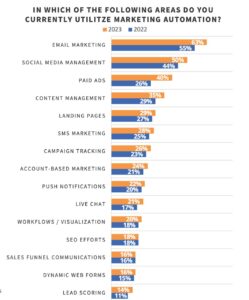
Automation requires the use of software tools and applications to automate various marketing strategies, such as:
- Search Engine Optimization (SEO) is the process of optimizing your website and its content to rank higher in search engine results (SERP). You can employ different SEO strategies for your B2B or B2C website by using automated software to increase visibility and traffic.
- Pay-per-click (PPC) advertising allows you to generate targeted traffic to your website or landing page. However, you get charged a fee each time your ad gets clicked. Marketing automation can help with content creation, data analytics, data-driven PPC management and performance tracking.
- Email Outreach involves sending customized emails to prospective clients or business partners using the warm or cold email generator. Marketing automation can help you advertise your products, establish rapport, and generate leads.
- Content Marketing entails producing and publishing valuable, relevant, and timely pieces of content. The goal is to draw in and engage with a specific target audience to influence their purchase decisions. Automation can optimize this marketing campaign.
- Social Media Marketing is about promoting your brand and interacting with prospects and customers via channels like Facebook, Instagram, Twitter, LinkedIn, or YouTube. Software automation can aid in various marketing tactics on social media, from ad generation to data analytics.
4. Personalize Marketing Messaging
Personalization is one key to marketing success. It lets you create experiences tailored specifically to individual customers. Nearly 90% of marketers see a boost in ROI in their marketing campaigns because of personalization. That’s where automation can help!
Michael Donovan, Co-Founder of Niche Twins, suggests harnessing the power of personalization by leveraging marketing automation. “You can craft highly targeted messages that connect with your potential customers by using the insights produced by marketing automation.”
Donovan recommends taking personalization steps using marketing automation:
- Send personalized emails. You can send customized email communications that cater to the unique requirements and tastes of each receiver. Thanks to marketing automation, this technology helps boost open and click-through rates and encourage customer engagement.
- Personalize content pieces. Marketing automation lets you produce and distribute personalized content, such as blog posts, landing pages, and product suggestions. While using AI writing assistants like ChatGPT, Frase, and Grammarly to create content, you can leverage automation to cater to your target audience’s unique needs and interests.
- Customize PPC ad copies. Marketing automation allows you to create tailored pay-per-click (PPC) ad copies that appeal to your target demographic. How? It enables you to utilize customer data and segmentation to ensure ad relevancy and boost click-through and conversion rates.
5. Offer Multiple Channels for Customer Journey
About 22% of marketers strongly agree marketing automation helps build an effective customer journey. While 53% somewhat agree, 8% strongly disagree, and 17% somewhat disagree. What better way to expand your marketing reach than to offer multiple channels for customer interactions?
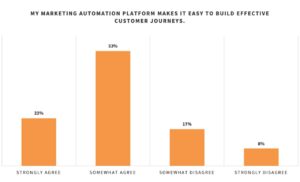
As a business, you can interact with consumers via your website, email, social media, and other digital platforms. Marketing automation paves the way for the seamless integration of these various touchpoints. It offers a unified and consistent customer experience, thus cultivating deeper relationships and enhancing customer journey.
Here’s how you can capitalize on marketing automation for your communication channels:
- Search Engines: Optimizing your website’s online presence through search engine marketing (SEM) and search engine optimization (SEO) can enhance your company’s online visibility and discoverability. Automation can streamline various SEO and SEM tasks.
- Company Website: A user-friendly, well-designed website can be a potent hub for lead generation, customer engagement, and sales conversion. However, to improve the customer experience, you should integrate marketing automation systems into your website.
- Email Promotion: Email campaigns can help your business stay in front of your audience’s minds and steer them toward successful conversion. To achieve your marketing objectives, consider automating your campaigns, such as welcome series, nurture workflows, and targeted offers.
- Social Media: There’s no denying the power of social media channels in today’s digital landscape. Leveraging these channels can broaden your reach and establish stronger relationships with your target audience. However, employ marketing automation to plan, post, and interact with content on social media platforms.
- Other Digital Platforms: You can also promote your business via different online platforms like e-commerce platforms, online forums, business listings, and other websites. However, automation enables integration by leading potential customers to your website for actual purchases. It also offers web analytics that lets you identify prospects interested in your business.
6. Track, Analyze, and Improve Your Marketing Performance
Marketing automation offers powerful analytics and reporting tools. These can help you monitor campaign performance, pinpoint areas for development, and make informed decisions based on data.
Grant Aldrich, Founder of Preppy suggests using marketing automation for measuring, monitoring, and optimizing performance. “Automation makes monitoring much more efficient and seamless, whether tracking SEO results, email responses, or social media engagement. It also offers data analytics to help you analyze your marketing performance. Ultimately, it provides insights into effective ways to optimize your marketing campaigns.”
Aldrich recommends leveraging marketing automation for the following:
- Performance Monitoring: Marketing automation platforms can use comprehensive performance monitoring tools to track campaign success in real time. These technologies offer insightful data on parameters such as website traffic, lead generation, and customer interaction.
- Data Analysis: Your marketing team can obtain deeper insights into consumer behavior, campaign success, and marketing ROI by combining marketing automation with advanced analytics capabilities. This allows for data-driven decision-making and ongoing development.
- Marketing Optimization: You can utilize automation to efficiently optimize your marketing campaigns and improve your strategies. It helps you accomplish your intended objectives by arming yourself with the insights gained from performance tracking and data analysis.
Final Words
Companies and organizations must recognize the potent role of marketing automation in today’s business landscape. You can optimize your marketing efforts and achieve desired outcomes through task automation, data-driven insights, and personalized experiences.
As such, consider the practical steps recommended above for maximizing your ROI using marketing automation.
Start by setting your marketing goals and metrics as well as end by tracking, measuring, and improving your performance. Likewise, customize your marketing strategies, automate manual tasks, and personalize your content messages. Plus, remember to offer multiple channels of communication.
But wait, there’s more. Find the most appropriate marketing automation tools for your business. Also, implement marketing tactics that are aligned with your business objectives and target market. Ultimately, monitor your marketing campaigns and adjust them accordingly.
With all these tips and steps, you can streamline your marketing operations. That opens up new opportunities for customer engagement, business growth, and long-term success!

